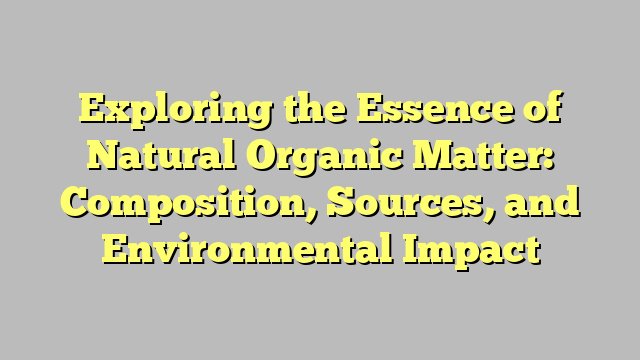Exploring the Essence of Natural Organic Matter: Composition, Sources, and Environmental Impact
Exploring the Essence of Natural Organic Matter: Composition, Sources, and Environmental Impact
Natural Organic Matter (NOM) plays a pivotal role in environmental systems, influencing water quality, soil fertility, and atmospheric chemistry. This article delves into the composition, sources, and environmental impact of NOM, providing a comprehensive understanding of its essence and significance.
Composition of Natural Organic Matter
NOM is a complex mixture of organic compounds derived from the remains of plants, animals, and microbial organisms. Its composition varies depending on the source and environmental conditions, but it generally includes:
- Carbohydrates
- Proteins and amino acids
- Lipids
- Nucleic acids
- Humic substances
Humic Substances
Humic substances are a major component of NOM, comprising humic acids, fulvic acids, and humin. They are formed through the decomposition of organic matter and play a crucial role in soil fertility and water quality.
Sources of Natural Organic Matter
NOM originates from both natural and anthropogenic sources. Natural sources include:
- Decomposition of plant and animal residues
- Microbial activity
- Leaching from soil and vegetation
Anthropogenic sources, on the other hand, involve:
- Agricultural runoff
- Urban wastewater
- Industrial discharges
Environmental Impact of Natural Organic Matter
The presence of NOM in the environment has both beneficial and detrimental effects, depending on its concentration and composition.
Beneficial Effects
- Soil Fertility: NOM improves soil structure, water retention, and nutrient availability, promoting plant growth.
- Water Quality: In aquatic systems, NOM can bind to pollutants, reducing their bioavailability and toxicity.
Detrimental Effects
- Water Treatment Challenges: High levels of NOM can complicate water treatment processes, leading to the formation of disinfection byproducts.
- Eutrophication: Excessive NOM can contribute to nutrient overload in water bodies, causing algal blooms and oxygen depletion.
Managing the Impact of Natural Organic Matter
Effective management of NOM is crucial to mitigate its negative impacts while harnessing its benefits. Strategies include:
- Improving agricultural practices to reduce runoff
- Enhancing wastewater treatment processes
- Implementing soil conservation measures
Conclusion
Natural Organic Matter is a fundamental component of the Earth’s ecosystems, influencing a wide range of environmental processes. Understanding its composition, sources, and impact is essential for developing strategies to manage its presence in the environment effectively. By doing so, we can protect water quality, soil health, and overall ecosystem integrity.
References
| Author | Title | Year |
|---|---|---|
| Smith, J. | The Role of Humic Substances in Soil | 2020 |
| Johnson, A. | Impact of Agricultural Runoff on Natural Organic Matter Levels | 2018 |
| Lee, K. | Water Treatment Challenges in the Presence of NOM | 2021 |

